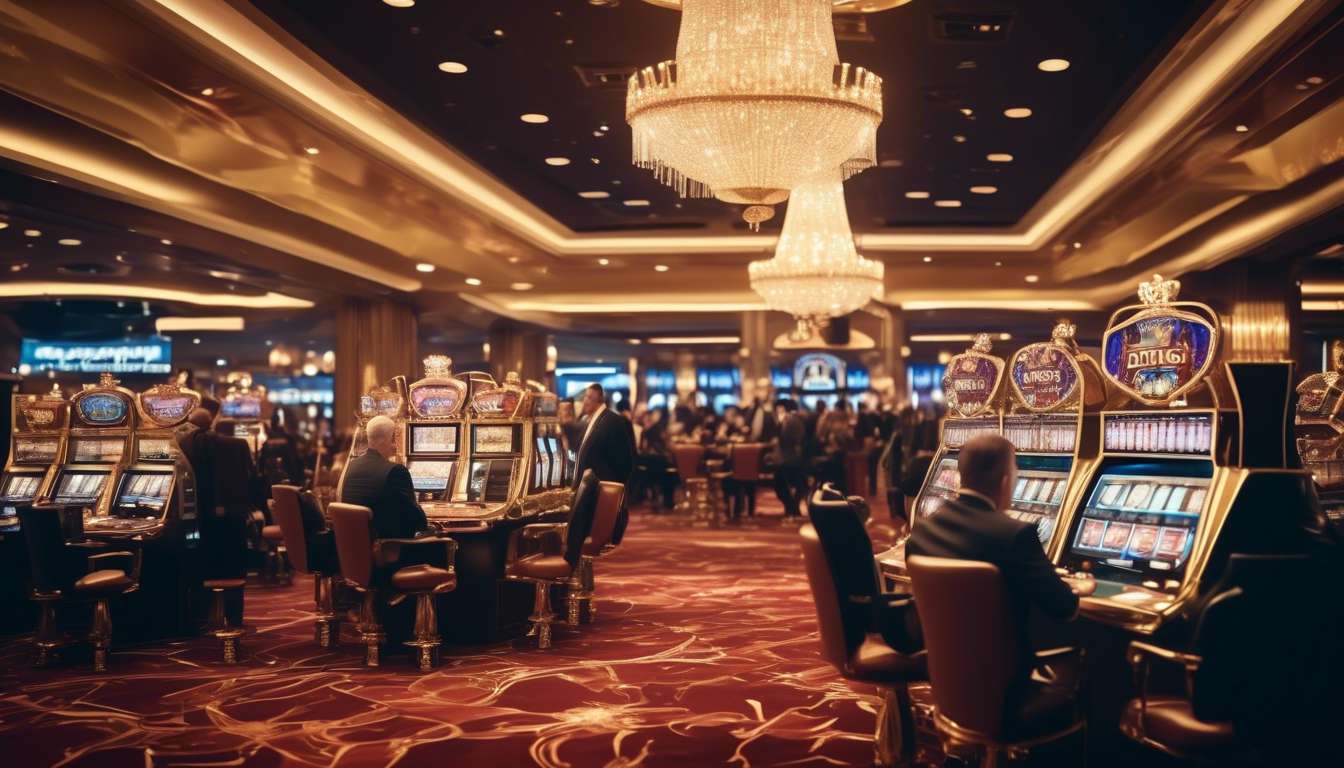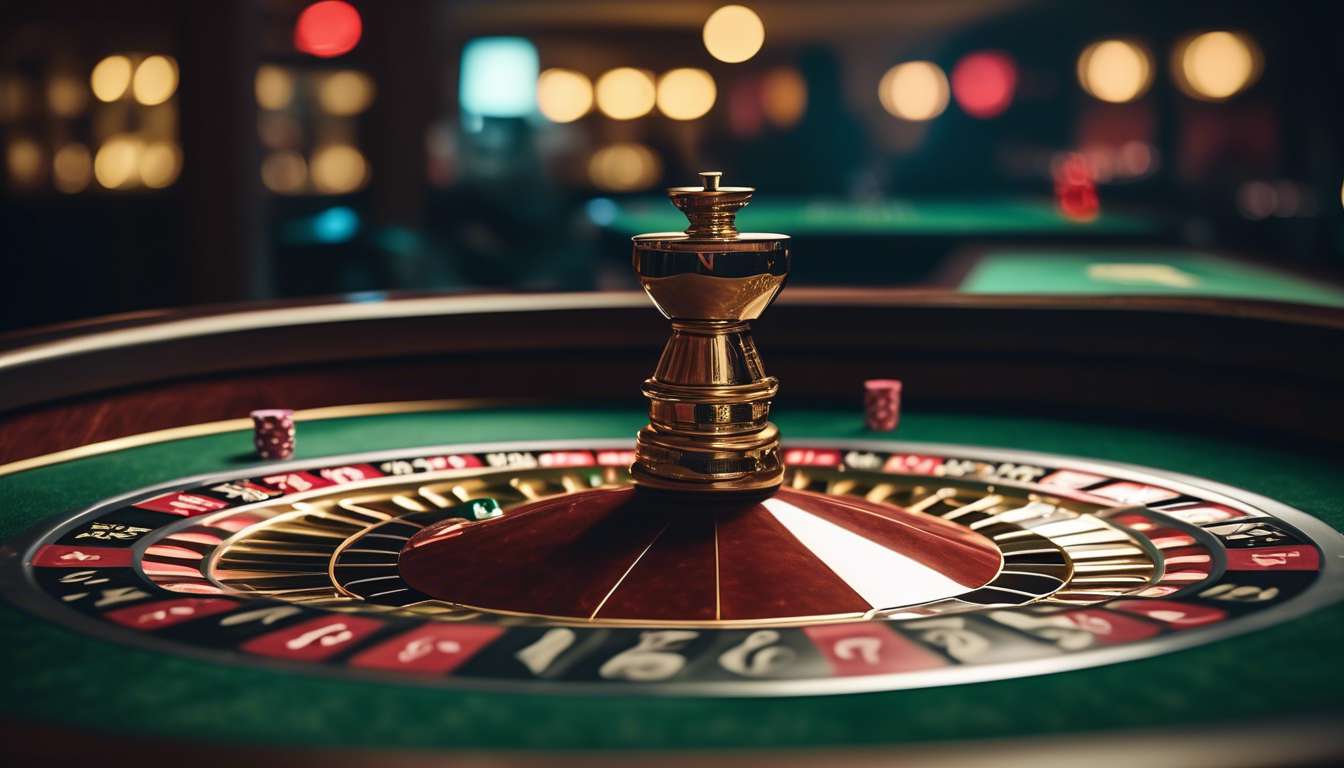As we embark on the fascinating journey through the history of casino games, we find ourselves captivated by the evolution of entertainment that has spanned centuries.
Together, we delve into the origins of these games, tracing back to ancient civilizations where gambling was not just a pastime but a reflection of cultural and social dynamics. From the rudimentary dice games played by the Egyptians and Romans to the sophisticated card games that gained popularity during the Renaissance, each era left its indelible mark on the world of gaming.
As we move forward through time, we witness the transformation of these games with the advent of modern casinos in the 20th century, paving the way for the digital revolution that now defines our current gaming landscape.
By exploring this rich tapestry of history, we gain insight into how casino games have continuously adapted and thrived, reflecting the ever-changing nature of human society and technology.
Ancient Origins of Gambling
Gambling has roots that trace back to ancient civilizations, where people engaged in games of chance as early as 2300 BC in China. We can imagine gathering together, feeling the excitement of rolling the dice, as our ancestors once did. These games were more than mere entertainment; they were a way to connect, to share experiences, and to belong to a community.
As time marched on, the allure of gambling never faded. These early forms of entertainment laid the groundwork for centuries of gaming culture. Dice, simple yet thrilling, became a symbol of chance and fortune.
- In many societies, throwing dice was as much about camaraderie as it was about luck.
- The anticipation, the shared tension, is something we can all relate to.
Fast forward to the digital revolution, and we find ourselves part of a global community that spans continents through virtual platforms. Yet, the core of it all remains unchanged: the thrill of chance and the joy of belonging.
Evolution of Dice Games
Throughout history, we’ve seen dice games transform from simple bone or stone cubes into intricate games that captivate players worldwide. Dice have always held a special place in gambling, drawing us together in shared moments of chance and excitement. As we roll the dice, we’re not just hoping for a favorable outcome; we’re connecting with an ancient tradition that binds us across time and cultures.
In the digital revolution, the essence of dice games has been preserved and expanded. Online platforms now allow us to experience the thrill of gambling with the click of a button. We can join virtual tables, engaging with fellow enthusiasts from the comfort of our homes. The digital age has made dice games more accessible, but it hasn’t stripped away the communal spirit they inspire.
Together, we’ve embraced this evolution, blending tradition with innovation. As we look forward, dice games will continue to evolve, inviting more of us into the fold of their timeless allure.
Rise of Card Games
Throughout centuries, card games have captivated players’ imaginations, evolving into a cornerstone of casino entertainment worldwide. As dice rolled through history, card games emerged, offering a new layer of strategy and luck. We’ve witnessed a transformation from simple decks to elaborate games like poker and blackjack, each adding a unique thrill to the gambling experience.
Card games bring people together, creating a shared sense of excitement and camaraderie. Whether we’re huddled around a table or participating in a tournament, the allure of drawing the right card is universal. Our fascination with these games only grows stronger as technology advances.
The digital revolution has propelled card games into the virtual world, expanding their reach and accessibility. Online platforms now host millions of players, connecting us across the globe.
In this digital age, card games continue to thrive, evolving alongside us while maintaining their timeless appeal in the ever-changing landscape of gambling.
Renaissance Gaming Trends
In recent years, we’ve witnessed a resurgence in classic gaming trends as players seek nostalgic experiences with a modern twist. This renaissance in gambling has brought together communities who cherish the thrill of traditional games like dice, yet embrace the digital revolution. Together, we’ve seen how technology enhances our beloved pastimes, making them more accessible and engaging.
The fusion of the old and new invites us to connect on a deeper level, sharing stories about the first time we rolled the dice or placed a bet. Digital platforms now host these age-old games, allowing us to experience the excitement from anywhere in the world. This evolution in gambling isn’t just about convenience; it’s about preserving a shared history while welcoming innovation.
As we embrace this blend of tradition and technology, we find ourselves part of a global community. We’re not just playing games; we’re engaging in a collective experience that bridges time and space, uniting us all.
Birth of Modern Casinos
A pivotal moment in the history of gambling arrived with the emergence of the first modern casinos, transforming the gaming landscape through their innovative approach to entertainment. These establishments became communal havens, where people could gather and share the thrill of chance and strategy.
The clatter of dice on green felt tables became a shared heartbeat, and the spinning roulette wheels echoed collective anticipation. People embraced these vibrant spaces not just for the games, but for the camaraderie and stories spun around every win and loss.
As modern casinos flourished, they offered more than just gambling; they became centers of social interaction, luxury, and excitement.
- Individuals found a sense of belonging there, united by shared experiences and the allure of possibility.
- The groundwork laid by these modern casinos paved the way for the digital revolution that we are part of today.
In the present, the spirit of those early days still thrives, now expanded into digital realms, yet rooted in that same communal spirit.
Digital Revolution Impact
As we embrace the digital age, online casinos have revolutionized the gaming industry by offering unprecedented access and convenience. We can now engage in gambling from the comfort of our homes, bringing together a global community that shares our love for the thrill of the game. No longer do we need to travel to bustling casinos to roll the dice or spin the wheel; the digital revolution has placed the entire casino experience at our fingertips.
This transformation has fostered a sense of belonging among players worldwide as we connect over shared strategies and experiences in digital spaces. The technology driving this revolution has enhanced not only accessibility but also the variety and security of games available to us.
We’re able to indulge in our favorite games without the constraints of time or location, fostering a new era of inclusivity in gambling. Together, we’re experiencing a shift that aligns with our desire for connection and excitement in the digital realm.
Online Casino Boom
The explosion of online casinos has transformed the gambling landscape, offering a plethora of gaming options and instant access to players worldwide. We’ve embraced this digital revolution, where our favorite games are just a click away, creating an inclusive community of gamblers who share our passion. With online platforms, we can roll the dice, spin the wheel, and play cards at any time, all from the comfort of our own homes.
This shift to digital has brought us together in new ways. We can engage with fellow enthusiasts, share strategies, and celebrate wins without geographic limitations. The sense of camaraderie is palpable as we explore the vast array of games and experiences available online.
- From classic table games to innovative digital slots, the options are endless.
As we dive deeper into this online world, we find ourselves not only enjoying the thrill of gambling but also being part of a vibrant, ever-evolving community. Together, we’re shaping the future of gaming.
Future Trends in Gaming
As we look ahead, emerging technologies like virtual reality and blockchain are poised to redefine our gaming experiences. We stand at the brink of a digital revolution:
-
Virtual reality transports us to immersive casinos, making us feel like we’re rolling the dice in a bustling Vegas strip.
-
Blockchain, with its promise of security and transparency, offers us a new level of trust in digital gambling.
Together, these innovations will not only revolutionize how we play but also how we connect with one another. Imagine sharing a virtual craps table with friends from across the globe, each of us experiencing the thrill of gambling as if we’re side by side. It’s a future that embraces our desire for community and excitement.
As we navigate this digital frontier, let’s embrace these changes, knowing that our collective love for games and camaraderie will guide us. We’re not just players; we’re pioneers in this exciting new era of gaming.
What role did gambling play in ancient religious or cultural rituals?
Gambling in Ancient Rituals
Gambling held significant importance in ancient religious and cultural rituals, serving as a means of divination or seeking favor from deities. It was a way to connect with the spiritual realm and make decisions based on chance.
Cultural and Spiritual Significance
This practice was deeply intertwined with beliefs and traditions, shaping the cultural fabric of societies. The act of gambling in these rituals was more than a game; it was a sacred practice that influenced:
- Daily life
- Communal bonds
Conclusion
Through these practices, gambling was elevated beyond mere entertainment, becoming a vital component of spiritual and societal dynamics.
How did early gambling practices influence societal norms or laws?
Early Gambling Practices and Societal Influence
Early gambling practices significantly influenced societal norms and laws by shaping attitudes towards risk-taking and chance.
Impact on Society:
- Our ancestors’ acceptance of gambling as a form of entertainment or economic activity helped establish regulations and codes of conduct.
- Communities learned to balance the excitement of gambling with the need for fairness and responsibility.
Long-term Effects:
- This foundation laid by early gambling practices continues to impact our modern views on risk and reward.
Through these experiences, societies developed a framework that balanced the thrill of gambling with ethical considerations, which persists in today’s approach to gambling and risk management.
What are some lesser-known historical gambling games that have disappeared over time?
There are many lesser-known historical gambling games that have vanished as time passed. These games were once popular choices for entertainment and betting, but they have faded into obscurity.
It’s fascinating to explore the variety of unique games that were once enjoyed by people in the past. Learning about these forgotten games offers us a glimpse into the diverse world of gambling throughout history.
By studying these games, we can appreciate the cultural and social aspects that shaped their development and popularity.
Conclusion
The Evolution of Casino Games
Reflecting on the rich history of casino games reveals their significant evolution, from ancient origins to the modern digital age.
Ancient Origins to Modern Casinos
- Dice and Card Games: These were among the earliest forms of gambling entertainment. They laid the foundation for many of the games we enjoy today.
- Rise of Modern Casinos: As societies evolved, so did the sophistication of gambling establishments, leading to the creation of grand casinos known for their opulence and variety of games.
Impact of the Digital Revolution
With the advent of digital technology, the gaming industry has undergone a massive transformation. The digital revolution has introduced:
- Online Casino Boom: The accessibility and convenience of online casinos have attracted millions of players worldwide, providing a vast array of games at their fingertips.
- Technological Innovations: Enhanced graphics, virtual reality, and live dealer games have enriched the gaming experience, making it more immersive and engaging.
Future Trends in Gaming
The excitement and innovation in gaming show no signs of slowing down. Looking ahead, we can anticipate:
- Increased Use of AI and Machine Learning: These technologies will continue to personalize and improve the gaming experience.
- Cryptocurrency and Blockchain Technology: These will likely become more integrated into gaming platforms, offering secure and transparent transactions.
In conclusion, the journey of casino games from ancient times to the present digital era highlights the industry’s adaptability and enduring appeal. As technology advances, so too will the ways in which we experience the thrill of gaming.




